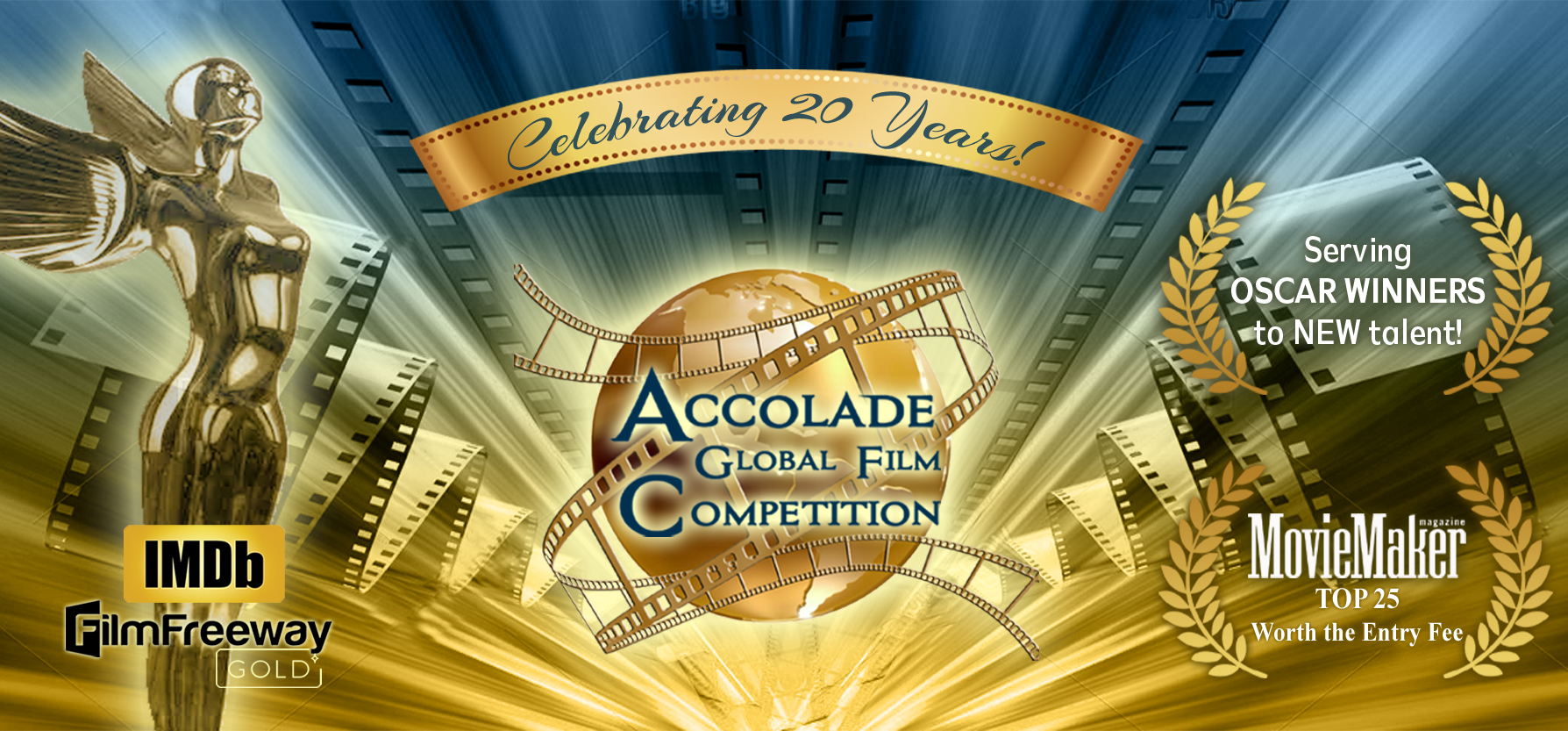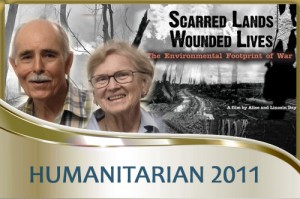
Accolade Competition awards its 2011 Humanitarian Award to: Scarred Lands & Wounded Lives: The Environmental Footprint of War, a married couple’s take on the world around us.
The scale of environmental damage is unprecedented. Falling water tables, shrinking forest cover, and declining species diversity are all a result of war. These issues and more take front and center in a documentary, Scarred Lands & Wounded Lives: The Environmental Footprint of War by film makers Alice and Lincoln Day.
Alice and Lincoln Day are a retired married couple who live in Washington, D.C. Accolade recently €‹discussed the film that took them more than three years to complete, along with their humanitarian efforts.
Q: Where did this idea stem?
A: The idea for Scarred Lands and Wounded Lives: The Environmental Footprint of War came about as a result of our participation over a period of nine years in the The Environmental Film Festival in the Nation’s Capital; first as enthusiastic spectators, then as volunteers, board members, and film reviewers. Although the topics covered in the Festival programs included a wide range of threats to the environment, we increasingly came to realize that the huge environmental damage resulting from armed conflict was largely being ignored. The film is our attempt to fill the gap. It aims to give audiences a greater understanding of how human being, indeed, all living things, depends on the health of the environment, and how, throughout history, the health of the environment has been compromised by war and preparations for war.
Q: What’s it like being married and doing a film together?
A: A lot of people seem to think it would be hard for a married couple to work together amicably on a project of this duration. But we’ve benefited from a lot of experience working together. We first met as graduate students in sociology at Columbia University. In the years since, in addition to numerous professional articles and several books in our respective areas of specialization, we have worked together on joint projects, mostly focusing on population, peace, and the environment.
Q: What was one of your earlier projects together?
A: A book called Too Many Americans, (Boston: Houghton Mifflin, 1964) in which we explored the impact of population increase in rich countries on the quality of life in those countries and its implications for the global use of natural resources.
Q: This was your first film, will there be a follow-up?
A: We didn’t think there would be, but after its screening at Chico State University in California in March 2010, a student member of the audience, a former army sergeant with two tours of duty in Iraq, approached us to say how moved he was by the film, and that he had taken over 3,000 pictures of the war damage in Iraq and would make them available to us if we wanted to make another film. We arranged to have him interviewed on film and spent the entire summer of that year going over those pictures and selecting ones that would illustrate what he was talking about. The result is a 19-minute photo essay film, What We Are Leaving Behind in Iraq.
Q: How do you feel about receiving the Accolade Competition’s 2011 Humanitarian Award for this film?
A: Pleased and honored.
Q: What makes you a humanitarian?
A: “Humanitarian” is a label that people have been applying to us when they see this film. We find this rather puzzling. It seems to us to be normal not to want people to be killed, children deprived of their parents and denied their basic needs for food and water, and the natural environment, upon which all life depends, destroyed.
Q: Why is this subject important to you?
A: We have been tracking the issue of climate change since 1988, when James Hansen, sponsored by Senator Tim Wirth first presented Congress with scientific data on major atmospheric changes. It seems clear to us that, quite apart from the direct effects war and preparations for war have on human beings, it is folly to continue the widespread and massive level of destruction war, and preparations for war, also have on the natural environment.
Q: Tell us about your cause/charity?
A: The environmental footprint of war is a sensitive topic about which people have intense feelings and strong views. We felt that in order to create the film we wanted to make on this topic we needed to be independent of any major funding source. Therefore, early on, we established ourselves as a 501(c 3) non-profit organization. We called our organization Fund for Sustainable Tomorrows because we believe that lightening the heavy environmental footprint of war is essential to achieving a planet that can survive into the future.
Q: What does it take to become a humanitarian in this day and age when most people are just trying to fend for themselves?
A: It takes recognition of the truth that to enjoy a decent quality of life and clear conscience, all of us must depend on each other. Fending for oneself and leaving others to stumble and suffer is a formula for discomfort and failure. Humanitarianism thrives on a sense of strong community
Q: Where do you go from here with this charity?
A: Damage to the environment from war and preparations for war unfortunately remains a timely topic. We are using this non-profit product of our 3½ years’ full-time un-paid labor as a tool for taking our message about the environmental impact of war to as many people, groups, and organizations as possible. The film has, so far, been shown in a variety of film festivals in the United States and abroad, as well as in colleges, churches, clubs, professional organizations, and private homes. It has been shown on Russia’s public television overseas program as well as on public television in the United States. In April 2011, we received the top award, Special Jury Remi Award, in its division, Ecology/Environment/Conservation, at the 44th annual Houston International Film Festival.
Q: Does it mimic Al Gore’s film, An Inconvenient Truth?
A: Our film was inspired by Al Gore’s strong commitment to doing something to check climate change. But far from mimicking An Inconvenient Truth, Scarred Lands aims to take a giant step beyond Gore’s depiction of the major sources of global warming by showing that war and preparations for war are the human activities responsible for the highest use of fossil fuel, the greatest emission of greenhouse gases, and through the production, testing and use of nuclear weapons, the most long-term toxic poisoning of land, air and water.

